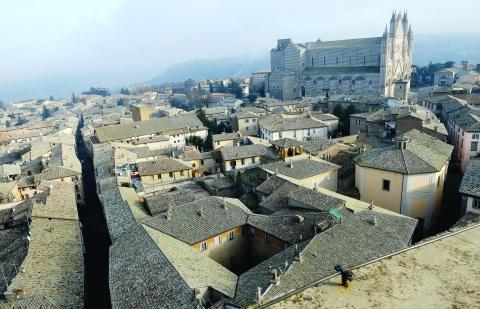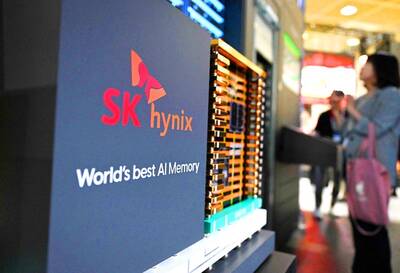Even as city living booms around the world, the Slow City movement directed by an intrepid Italian is gaining a global following with a back to basics campaign to make small towns the new place to be.
From his hometown of Orvieto — a hilltop medieval gem surrounded by castles and vineyards in central Umbria — Pier Giorgio Oliveti has helped expand Cittaslow to 28 countries, including South Korea, Turkey and the US.
“Cittaslow is about appreciating what we are and what we have, without being self-destructive and depleting values, money and resources,” Oliveti said.

Photo: AFP
“It is an antidote against negative globalization,” the bushy-bearded former journalist said.
Founded in 1999 by a Tuscan mayor eager to extend the healthy living philosophy of Italy’s Slow Food movement to urban life, Cittaslow boasts 183 members, with another dozen applications for membership pending.
The movement’s symbol — derived from that of the Slow Food movement — embodies their philosophy: a snail carrying a town built on its shell.

Photo: AFP
Would-be candidates must have fewer than 50,000 inhabitants and city halls have to respect strict criteria like promoting organic and urban farming and introducing food appreciation classes in schools.
Orvieto, one of the first towns to sign up 15 years ago, has become the movement’s international headquarters and its showcase town.
Small family-run trattorias dish out locally sourced wine and delicacies — another requirement for Cittaslow towns — and farmers hawk their wares at the market, which also serves as the community’s lively social hub.
The town hosts a family-friendly jazz festival and locals such as firefighter Luciano Sabottini pride themselves on offering such a relaxing atmosphere to tourists that “those who come from Rome or Milan leave again mellowed out.”
Pollution levels are low: Visitors park in large underground carparks, masked from sight behind earthy walls that blend into the rockface, and take escalators installed in old aqueduct tunnels up to the pedestrianized center.
Schoolchildren are walked to school every day in groups by parent volunteers in an initiative dubbed “PiediBus” (FootBus) in a procession through town streets.
Orvieto Mayor Antonio Concina says running a Slow City is “neither difficult nor odd.”
“It’s not a matter of stopping progress to allow a town to respect the slow rules. They can go hand in hand,” he said.
However, Cittaslow’s message of environmentally friendly, human-sized policies to improve urban life is being challenged by an economic crisis in Italy that has pushed unemployment to record-high levels.
Orvieto has not been spared: According to a report by town assembly members, “entire sectors have closed,” with 153 businesses shutting shop in the past four years and unemployment at 35.4 percent — far higher than the national average.
“We’re are fighting to keep our heads above water. Orvieto was once full of carpenter workshops, there was one on every street. I think we’re the only ones left,” said Gaia Ricetti, whose family has worked wood for seven generations.
The large, 18th-century Michelangeli workshop hidden down a cobbled street in the center of Orvieto is abuzz with electronic saws — the sound of industry Concina says he would be keen to hear more of, slow city or not.
“Not having large-scale industries does hamper economic development,” and multinationals like coffee chain Starbucks “would mean work, a living economy,” although Concina said he would definitely prefer not to have any Starbucks around.
Oliveti believes the Cittaslow philosophy can be used to the same end, by “privileging a community’s qualities, such as craftmanship, technology or tourism, and using them as a key to overcome the economic crisis.”
Orvieto prides itself on its remaining traditional artisans, printers and potters, working in old laboratories dotted around the town center.
“We have clients from Italy and abroad, but no plans to move away to expand the business. It’s not about money, it’s about living a tranquil life,” ceramics maker Walter Ambrosini said, as he put freshly crafted cups into a kiln.
Despite the crisis, Ricetti agrees: “We would not be able to produce the same quality of product without the slow component. We weather our wood for five years before working it and Orvieto gives us the time and space to do so.”
While the movement is currently limited to small towns, Oliveti said he hopes to persuade larger cities from Barcelona to Seoul to adopt some of the movement’s ideas and generate “islands of Cittaslow culture” in the bustle.

Intel Corp chief executive officer Lip-Bu Tan (陳立武) is expected to meet with Taiwanese suppliers next month in conjunction with the opening of the Computex Taipei trade show, supply chain sources said on Monday. The visit, the first for Tan to Taiwan since assuming his new post last month, would be aimed at enhancing Intel’s ties with suppliers in Taiwan as he attempts to help turn around the struggling US chipmaker, the sources said. Tan is to hold a banquet to celebrate Intel’s 40-year presence in Taiwan before Computex opens on May 20 and invite dozens of Taiwanese suppliers to exchange views

Application-specific integrated circuit designer Faraday Technology Corp (智原) yesterday said that although revenue this quarter would decline 30 percent from last quarter, it retained its full-year forecast of revenue growth of 100 percent. The company attributed the quarterly drop to a slowdown in customers’ production of chips using Faraday’s advanced packaging technology. The company is still confident about its revenue growth this year, given its strong “design-win” — or the projects it won to help customers design their chips, Faraday president Steve Wang (王國雍) told an online earnings conference. “The design-win this year is better than we expected. We believe we will win

Power supply and electronic components maker Delta Electronics Inc (台達電) yesterday said it plans to ship its new 1 megawatt charging systems for electric trucks and buses in the first half of next year at the earliest. The new charging piles, which deliver up to 1 megawatt of charging power, are designed for heavy-duty electric vehicles, and support a maximum current of 1,500 amperes and output of 1,250 volts, Delta said in a news release. “If everything goes smoothly, we could begin shipping those new charging systems as early as in the first half of next year,” a company official said. The new

SK Hynix Inc warned of increased volatility in the second half of this year despite resilient demand for artificial intelligence (AI) memory chips from big tech providers, reflecting the uncertainty surrounding US tariffs. The company reported a better-than-projected 158 percent jump in March-quarter operating income, propelled in part by stockpiling ahead of US President Donald Trump’s tariffs. SK Hynix stuck with a forecast for a doubling in demand for the high-bandwidth memory (HBM) essential to Nvidia Corp’s AI accelerators, which in turn drive giant data centers built by the likes of Microsoft Corp and Amazon.com Inc. That SK Hynix is maintaining its